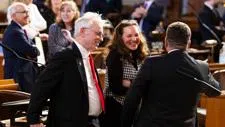LINCOLN — Nebraska lawmakers have passed a balanced two-year state budget totaling approximately $11.1 billion in general fund spending, narrowly avoiding a looming deficit that at one point reached $432 million. The Legislature gave final approval to the mainline budget bills on Thursday, sending them to Governor Jim Pillen, who still holds the authority to issue line-item vetoes. Lawmakers could then attempt to override any such vetoes.
The budget, which covers the biennium from July 1, 2025, to June 30, 2027, proposes a modest 0.9% increase in state spending and leaves roughly $2.6 million unallocated at the end of the cycle. Governor Pillen praised the plan, highlighting its prioritization of education, property tax relief, support for individuals with developmental disabilities, and funding tied to national nuclear security.
To close the gap, legislators enacted a three-phase approach. First, two revenue bills were passed—scaling back certain tax incentives and reducing the teacher retirement plan contribution rate—generating an estimated $133 million. Second, more than $410 million in spending cuts were approved, targeting departments like the DMV, the University of Nebraska system, and local health agencies. Finally, lawmakers authorized a $137 million draw from the state’s cash reserve, bringing it down from over $877 million to about $684 million.
While many cuts were characterized as reductions to unused funds, Appropriations Chair Rob Clements acknowledged some of the decisions would be painful. The budget also includes new spending increases, such as $67 million for special education and $61 million for Medicaid and the Children’s Health Insurance Program.
Still, concerns remain. Critics pointed to the state’s ongoing financial instability, including a projected $113 million shortfall in the following budget cycle. Senator Machaela Cavanaugh of Omaha called it a “self-inflicted crisis” and warned of legal risks tied to controversial fund transfers from the Nebraska Environmental Trust and the Board of Educational Lands and Funds, which she argued could violate the state constitution.
Senator Wendy DeBoer of Bennington echoed concerns about long-term viability, saying the budget rests on “questionable pillars” and will likely require additional funding requests from state agencies next session. Despite dissent from several lawmakers, the budget now awaits Gov. Pillen’s final action.


















Comments